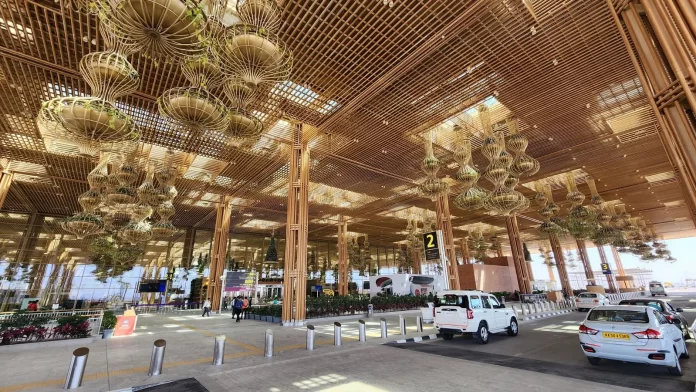The Bangalore International Airport Limited calls its newly constructed Terminal 2 (T2) as a “Terminal in a Garden.” A biodiversity hotspot, it features 600 plus one-year old trees, 180 rare and endangered species, and extensive bamboo cladding.
The new terminal’s design, a company note says, is inspired by the Garden City of Bengaluru. BIAL sourced six lakh plants from ten ecological habitats across the country for creating a garden-like environment. The terminal not only enhances indoor air quality but also achieves a 24.9% energy savings through the use of solar panels, sky lighting, and a rainwater harvesting system.
As a result of its sustainable practices, Terminal 2 became the largest airport terminal in the world to receive LEED Platinum Precertification by the US Green Building Council, even before its operations commenced. T2 was also awarded the prestigious IGBC Platinum certification under the IGBC Green New Building rating system.
The Kempegowda International Airport commenced operations in 2008. It has emerged as the third busiest airport in India. From early days this airport has been practicing Water Stewardship, Net Zero Carbon Emission, Community Aligned Noise Management, Circular Economy, Sustainable Procurement, and Sustainable Mobility. All these contributes to 11 of the 17 United Nations’ Sustainable Development Goals (UNSDGs) and indirectly contributes to the other six.
KIA is a signatory of the United Nations Global Compact Initiative. – a voluntary leadership platform for the development, implementation, and disclosure of responsible business practices.
KIA aims to use 10% of its Sustainable Aviation Fuel infrastructure by 2030.
Support Schools
Through its KIAF wing, KIA has adopted and reconstructed five government schools through its Namma Sikshana program. Additionally, it has refurbished eleven schools and twenty-one preschools. In collaboration with the Forest Department and the Government of Karnataka, the airport has also initiated the conservation of India’s First Biodiversity Heritage Site. It supports local artisans and small-scale enterprises by providing dedicated retail spaces and organizes events for them.










